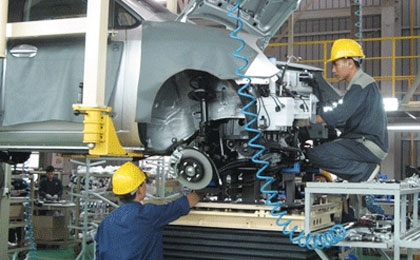State auto import ban to boost local sales
 |
The Ministry of Finance (MoF) last week announced it banned state-run agencies and enterprises from buying overseas automobile complete built units (CBUs) from early December, 2010 to rein in the country’s trade deficit. The vehicles subjected to the new rule include those that have between four and 16 seats.
The MoF did not specify an end date to the ban, stressing that it would be implemented until a new government instruction on public car purchasing was issued.
As of June 2010, state-run agencies from the central to local levels had used up to 25,662 cars worth a total of VND12.7 trillion ($651 million), with many of them imported from overseas, according to MoF statistics.
Ho Chi Minh City topped the list with about 1,000 public cars, while Hanoi ranked second with more than 800 vehicles.
Minister of Industry and Trade (MoIT) Vu Huy Hoang said state-run agencies and enterprises were encouraged to use locally-assembled vehicles instead of imported units to lessen their foreign currency demand and the trade deficit.
Local car assemblers expected the new rule would help them increase sales in the last month of the year and early next year, as Vietnam is on the eve of its traditional Lunar New Year festival, to take place in early February, 2011.
Vietnam-based automobile assembling firms experienced significant declines in their sales in the local market since early this year because of weak consumption power and unstable macroeconomic situation.
According to the Vietnam Automobile Manufacturers’ Association (VAMA), its 17 member enterprises incurred a 9 per cent decline in their sales to 11,198 units in November year-on-year. Their January-November sales also fell 4 per cent on-year to 99,978 units.
The assemblers also voiced concerns over their lower competitiveness with imported CBUs when the MoF recently proposed to cut import tariffs on less-then-nine-seat foreign cars to 70 per cent next year, from the current 83 per cent, to realise the Common Effective Preferential Tariff (CEPT) in the ASEAN Free Trade Agreement (AFTA).
VAMA chairman Akito Tachibana said that step-by-step reduction would be required to help local industry have some lead-time to comply with CBU competition and also to reduce the trade deficit.
“At present, due to the low competitiveness of Vietnam’s car industry and an under-developed supporting industry, a CEPT roadmap should be clear so that we can have a long-term strategy and plan for stable development in Vietnam,” Tachibana told VIR.
Foreign-made automobile products, particularly less than nine-seat vehicles, have been so far among those being put under control, and prevented from being imported in Vietnam, as the country was fighting a high trade deficit.
Earlier this year, local authorities predicted that the country would import some 65,000 CBUs worth about $1 billion in 2010. Actually, the figure will be much lower due to the authorities’ control measures and low market demands.
MoIT data showed that Vietnam imported 4,000 CBUs worth $72 million in November, down 66 per cent in volume and 57 per cent in value against last year’s same month.
CBUs imported in the first 11 months of the year also fell 35 per cent in volume and 21 per cent in value to 45,606 units worth $836 million.
What the stars mean:
★ Poor ★ ★ Promising ★★★ Good ★★★★ Very good ★★★★★ Exceptional
 Tag:
Tag:
Related Contents
Latest News
More News
- Hermes joins Long Thanh cargo terminal development (February 04, 2026 | 15:59)
- SCG enhances production and distribution in Vietnam (February 04, 2026 | 08:00)
- UNIVACCO strengthens Asia expansion with Vietnam facility (February 03, 2026 | 08:00)
- Cai Mep Ha Port project wins approval with $1.95bn investment (February 02, 2026 | 16:17)
- Repositioning Vietnam in Asia’s manufacturing race (February 02, 2026 | 16:00)
- Manufacturing growth remains solid in early 2026 (February 02, 2026 | 15:28)
- Navigating venture capital trends across the continent (February 02, 2026 | 14:00)
- Motivations to achieve high growth (February 02, 2026 | 11:00)
- Capacity and regulations among British areas of expertise in IFCs (February 02, 2026 | 09:09)
- Transition underway in German investment across Vietnam (February 02, 2026 | 08:00)




















 Mobile Version
Mobile Version